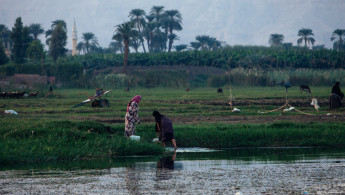Ethiopia dam plan would 'threaten Egypt's national security'
Abdel Aty believes that Egypt's heavy reliance on Nile waters increases the threat posed by the Grand Renaissance Dam due to a lack of alternative water sources.
Future threats
Egypt's annual rainfall of 1.8 billion metres is not sufficient to meet the country's needs, and desalination plants only contribute one percent of the country's requirements, says Abdel Aty.
Egypt's non-renewable groundwater supplies are substantial, but these reserves still require closer analysis to see whether they could be used for drinking water or irrigation.
There are also concerns that extracting these supplies could lead to long-lasting environmental damage, Abdel Aty said.
Egypt's ministry of water resources and irrigation recently announced a plan to determine the amount of groundwater available in the country as part of a larger plan to restore a million acres of arid land to agricultural use.
According to a report published by the Center for Environment and Development for the Arab Region and Europe, Egypt relies on the River Nile for 97 percent of its water needs.
For Egypt to receive self-sufficiency in agriculture, poultry and dairy industries, it would require more than double its current allocation of the river's waters.
Due to Egypt's reliance on the Nile, many water experts believe that Ethiopia's dam poses a huge threat to Cairo's water security. Some believe this amounts to a national security threat.
Jamal Siyam, a water expert, believes that a recent agreement on the Nile's resources - signed by Egypt, Sudan and Ethiopia - does not ensure Egypt's water quota is met.
| It would be a knock out blow to Egypt, especially to the agriculture sector. - Jamal Siyam, water expert |
One of the most contentious features of the Ethiopian dam project is its capacity.
Ethiopia has proposed that the dam could store 74 billion cubic metres of water, while Egypt wants this to be limited to 14 billion.
"It would be a knock-out blow to Egypt, especially to the agriculture sector," said Siyam.
Security threat
Siyam said that if Ethiopia presses ahead with its plan and filled the reservoir within three years, Egypt would lose approximately half of its Nile water.
He predicted that this would result in half of Egypt's agricultural land - where 20 million Egyptians live - having inadequate irrigation they need to grow produce.
Maghawri Shahata, a professor of hydrogeology and water resources, agrees the Ethiopian plan would prove disastrous for Egypt.
"The construction of the Grand Renaissance Dam in its current form undoubtedly threatens Egypt's national security, and Egypt must come to an agreement with Ethiopia about the capacity of the dam, in addition to taking part in operating the dam," he said.
Shahata stressed that Egypt was already suffering from water shortages and construction of the dam would exacerbate the problem.
"The governorate of Kafr al-Sheikh is suffering a severe shortage of irrigation water in addition to other areas such as the central and north Nile Delta region," he said.
If Ethiopia builds a 74 billion cubic metre reservoir, it would affect Egypt's access to clean and safe drinking water, he said, along with the irrigation needed for agriculture to continue around the Nile Delta region.
This article is an edited translation from our Arabic edition.


![President Pezeshkian has denounced Israel's attacks on Lebanon [Getty]](/sites/default/files/styles/image_684x385/public/2173482924.jpeg?h=a5f2f23a&itok=q3evVtko)



 Follow the Middle East's top stories in English at The New Arab on Google News
Follow the Middle East's top stories in English at The New Arab on Google News


